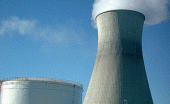Re Ian Bremmer 'Could third-party candidates upend the 2024 US election?' 3 April The current political movement in the USA…
AECL
Written by Diana Thebaud Nicholson // June 30, 2011 // Canada, China, Health & Health care, John Jonas, Nuclear, Politics, Québec, U.S. // 3 Comments
AECL pulls plug on costly reactor project
(CBC) The federal government has quietly shelved development of a new Canadian nuclear reactor that has already cost taxpayers more than $300 million, and now may never leave the drawing board.
CBC News has learned the government-owned Atomic Energy of Canada Ltd. pulled the plug on the project about six months ago, despite the huge public investment in the technology.
[SNC-Lavalin] appears to be pinning its near-term sales hopes on an enhanced version of Atomic Energy’s proven and internationally acclaimed CANDU reactor.
The deal inked this week between the government and SNC-Lavalin specifically gives the company $75 million from the public purse to complete development of the so-called Enhanced CANDU reactor, or “EC6.”
28 June
(RCI) The Globe and Mail newspaper reports that the Canadian government is set to sell Atomic Energy of Canada Ltd. to the country’s biggest engineering firm. According to the newspaper, the government will sell AECL’s commercial division to SNC-Lavalin Group. The division manufactures the Candu nuclear reactor. The government would retain ownership of the Chalk River laboratory but it would be managed by outside contract. In May 2009, Prime Minister Stephen Harper’s Conservative government announced plans to spin off AECL’s profitable commercial reactor business from its problem-plagued research division. The announcement coincided with what turned into a lengthy shutdown of the company’s research reactor at Chalk River, ON, which caused a worldwide shortage of the medical isotopes used to detect cancer and heart ailments. AECL has lost $493 million in the last two years. Supporters of AECL say they fear the government is risking the loss of a valuable reactor technology. Candu reactors supply one-half of the province of Ontario’s electrical power.
AECL sale to SNC-Lavalin near
(CBC via HuffPost) The Harper government is expected to announce the sale of Atomic Energy of Canada Ltd. to SNC-Lavalin Group of Montreal, ending a federal withdrawal from the nuclear energy business that has been in the works since 2009.
The anticipated sale would include the Candu reactor business but not the Chalk River, Ont., nuclear reactor unit that makes medical isotopes and does research.
An announcement could come as early as this week, media reports said, although final details are still being worked out.
20 June
Don’t give up on AECL –
(Ottawa Citizen) “Beyond the myriad other benefits CANDU technology offers, if this technology had been present in the nuclear reactors at the Fukushima Daiichi plant in Japan, much, if not most of the disaster following the earthquake and tsunami could have been averted.” Meantime, the Feds are preparing to slash AECL’s budget by up to 85%.; the good news is that SNC Lavalin is still interested in acquiring AECL, although we wonder about its value if the Feds are to retain the R&D functions.
17 June
Nuclear power struggling in post-Fukushima world
(BNN) A number of countries have shelved their nuclear power in the wake of the nuclear meltdown in Japan.
But Glenna Carr, Chair of the Board of Directors of Atomic Ltd. [AECL], tells BNN the industry is already on the mend – and that many countries will struggle to replace nuclear energy with low-carbon emitting power.
24 March
Election deals another blow to AECL revamp
Problem-plagued Atomic Energy of Canada Ltd. is facing a further setback to its recovery plan as a looming federal election promises to delay its long-awaited restructuring.
Crippled by cost overruns and confronting an anti-nuclear backlash after Japan’s reactor disaster, AECL has had its business development plans put on hold while Ottawa pursues the selloff of its reactor division.
21 March
Nuclear commission orders Canadian reactors to review safety plans
In the wake of the nuclear crisis in Japan, the Canadian Nuclear Safety Commission has ordered all reactor operators to revisit their safety plans and report on potential improvements to be made by April’s end.
Coalition fights Quebec’s nuclear plant
A Quebec coalition of politicians and activists is calling for the permanent closure of the province’s lone nuclear facility in light of the crisis in Japan.
The group says maintaining Quebec’s Gentilly-2 power plant is dangerous, given the disaster at Japan’s Fukushima Daiichi nuclear plant.
18 January
Ottawa must get deal quickly on AECL: minister
(CTV) With the sale of Atomic Energy of Canada Ltd. possibly in jeopardy, Ontario’s energy minister is calling on Ottawa to move quickly in deciding the fate of the Crown-owned company.
Two major bidders for AECL have apparently bowed out, which leaves Ontario’s plan to buy two nuclear units in limbo.
The federal government put AECL’s troubled CANDU reactor business up for sale in 2009, which delayed the province’s ability to move ahead with the purchase, Brad Duguid said Monday.
2010
23 December
Global supply under pressure
They’re the backbone of nuclear medicine. Medical isotopes — tiny radioactive particles that can be injected into the body — have become the standard treatment for some cancers. They’ve also brought medical imaging to new levels.
And much of the world’s supply is produced in Canada.
The National Research Universal (NRU) reactor went fully online at Chalk River, Ont., on Nov. 3, 1957. It has been used for scientific research, including the development of nuclear medicine. It remains the biggest single source in the world of the isotope cobalt-60, which has been used in cancer treatment for more than half a century.
Chalk River’s importance gained worldwide attention in 2007 when the reactor was shut down for maintenance, causing a worldwide shortage of medical isotopes. And it was underscored again in August 2008 when the other four major producers of isotopes — reactors in the Netherlands, Belgium, France and South Africa — all scheduled maintenance and refuelling stops within weeks of each other.
10 November
Paradis wants AECL sale completed ‘soon’
(CTV) Federal Natural Resources Minister Christian Paradis says he wants a deal to sell off Atomic Energy of Canada Ltd. completed “sooner rather than later.” Paradis told reporters in Calgary that AECL, the way it is right now, is “unsustainable” and that it is being restructured to diminish the burden on the Canadian taxpayer.
20 September
Duhaime takes SNC on new path with AECL bid
After taking over from legendary CEO Jacques Lamarre, Pierre Duhaime has quickened SNC-Lavalin charge into emerging markets with acquisitions in Brazil and Russia.
But after 16 months at the head of Canada’s leading engineering firm, Mr. Duhaime is pursuing his highest-profile and potentially riskiest deal right here at home, with a bid for federally owned, financially troubled Atomic Energy of Canada Ltd.
7 July
Chalk River to resume producing nuclear isotopes
After undergoing repairs for more than a year, the nuclear facility at Chalk River, Ont., is safe and can begin producing isotopes again, the Canadian Nuclear Safety Commission has said.
12 June
AECL requests hearing to restart leaky isotope reactor
Canada’s nuclear watchdog is fast-tracking a request for a hearing to consider reopening the country’s aging medical isotope-producing reactor.
Atomic Energy of Canada Ltd. made a request Friday for a formal hearing in hopes of restarting medical isotope production at the Ontario plant by mid-summer.
1 April
Ottawa rules out new medical isotope reactor (04/01/2010)
The federal government is turning thumbs down on a recommendation from its own expert panel to build a new nuclear reactor to produce medical isotopes
The government commissioned a study last May during the height of the isotope shortage crisis, created when the half-century-old reactor at Chalk River, Ont., broke down.
The shutdown forced hospitals to delay tests for a number of illnesses, including cancer.
The panel recommended in December that the “best primary option” is to replace the reactor and to start the development process as soon as possible.
The government responded Wednesday in a 13-page report, saying a new reactor would be too expensive and take too long to build.
17 February
Medical isotopes: What are the alternatives?
It is a waiting game with uneasy questions and uncertain answers: When will this latest medical isotope shortage end? What will the costs be? And how can such shortages be prevented in the future?
Atomic Energy of Canada (AECL) officials said on Aug. 12, 2009, that Ontario’s Chalk River nuclear reactor will not be able to restart producing medical isotopes until the spring of 2010, at the earliest.
A spokesman for AECL said by early January 2010, only 24 per cent of the work had been completed. But — despite the pace — things are progressing well.
2009
The Maple reactors can keep Canada’s isotope industry alive
(Globe & Mail) … This situation, which has been described as a catastrophe by leaders in nuclear medicine, should be the catalyst for a long-overdue solution to the supply of medical isotopes – a made-in-Canada solution to benefit patients and support this country’s leadership in a vital industry.
Unfortunately, the government has rejected a made-in-Canada solution and recently stated its desire to exit the production of isotopes altogether. We believe this is the wrong public policy decision for Canada and for the world.
The NRU (National Research Universal) reactor at Chalk River, Ont., is the world’s oldest and largest producer of medical isotopes, supplying up to 40 per cent of world demand and 50 per cent of North American demand. These isotopes are processed by MDS Nordion in Ottawa, and supplied to radiopharmaceutical companies for distribution to hospitals and radiopharmacies throughout the world.
Canadian-produced isotopes are used in about 50,000 medical procedures a day, with 5,000 of those here in Canada.
8 July
Chalk River reactor idled to late 2009 or longer
(CBC) The nuclear reactor at Chalk River, Ont. — normally a major world supplier of medical isotopes — will be out of service until at least late 2009, Atomic Energy of Canada Ltd. officials said Wednesday.
The reactor could be closed even longer if there are delays in the inspection and repair process, according to the president of the Crown corporation, Hugh MacDiarmid.
Canada’s nuclear crossroads: steps to a viable nuclear energy industry
12 June
It depends on what the meaning of the word ‘is’ is
(Maclean’s) Natural Resources Minister Lisa Raitt, yesterday afternoon in QP. “AECL has world class scientists who worked for 12 years to get the MAPLE reactors working. After 12 years and over $.5 billion not one single isotope was actually produced.”
Jill Chitra, vice-president and professional engineer at MDS Nordion, testifying at the standing committee on natural resources, shortly thereafter. “From 2000 to 2008, the MAPLE reactors ran numerous times at various power levels, up to 80 per cent power. Targets were inserted in the reactor for a number of those tests. When targets are inserted in the reactor and it operates at power, isotopes — Moly-99 — is created. Those targets could have been removed and processed and you’d have had medical isotopes for sale. It’s one of the reasons we think MAPLE has potential.”
9 June
The Little Reactors that Couldn’t
How a MAPLE-glazed dream got us into a sticky mess, changing Canada’s role in nuclear medicine.
(The Tyee) On May 15, workers inspecting a 52-year-old machine in a small Ontario town discovered a slight water leak caused by corroded metal. The machine’s owner announced it would be out of service until the problem could be identified and repairs made.
That would not be national news except that the machine in question is the NRU nuclear reactor in Chalk River, owned by federal Crown corporation Atomic Energy of Canada Limited (AECL).
And that reactor is the largest source in the world of a radioactive isotope important to medical imaging and diagnosis.
2 June
Secret federal documents reveal full AECL funding
(CTV) Sensitive government documents left behind at a CTV News bureau reveal Ottawa has poured far more money into the aging Chalk River nuclear reactor than the public has been told.
The binder of documents was left nearly a week ago at CTV’s Ottawa bureau by either Minister of Natural Resources Lisa Raitt or one of her aides. Some of the papers are clearly marked “secret.”
Ontario’s Chalk River reactor supplies at least one third of the world’s medical isotopes, which are used in diagnostic tests for some forms of cancer. Atomic Energy of Canada Ltd. shut down the reactor last month because of a heavy water leak.
In documents headlined “Background for discussion with chair of Atomic Energy Canada,” the government lists funding for the Crown corporation at $351 million for 2009-2010. That figure was in the January budget.
Canada’s nuclear crossroads: steps to a viable nuclear energy industry
(C.D. Howe Institute Commentary/June 2009)
Canada is at an energy and environmental crossroad. Fossil fuels cause environmental damage and the growth potential of large-scale hydroelectricity is limited. Policymakers are reconsidering the merits of nuclear power as both a low-carbon emitting and low-cost base load electricity source.
While nuclear power may look like an attractive option, nuclear power must overcome problems such as the high and uncertain cost of construction, dealing with nuclear waste, reactor licensing and regulation, and the future of Canada’s nuclear reactor builder, Atomic Energy of Canada Limited (AECL), a federal Crown corporation.
We examine three key policy questions facing the nuclear industry: cost, privatization of AECL, and regulation. … The future of nuclear power in Canada is positive–if policymakers can resolve these key issues
2008
19 May
AECL halts development of MAPLE project
(World Nuclear News/WNN) The MAPLE (Multipurpose Applied Physics Lattice Experiment) is a pool-type reactor with a compact core of low-enriched uranium fuel surrounded by a vessel of heavy water. The two MAPLE units were to be the world’s first reactors dedicated exclusively to medical isotope production. Once completed, the reactors could have supplied the entire global demand for molybdenum-99, iodine-131, iodine-125 and xenon-133. At any one time, one MAPLE reactor was to be the primary isotope producer while the other reactor would be available for full back-up.
The first two 10 MW MAPLE units were undergoing commissioning at Chalk River. The reactors were originally scheduled to start up in 2000. One unit went critical in 2000, the second in 2003, but commissioning encountered major technical problems.
AECL said that it has now decided to end development of the reactors after a series of reviews which considered, among other things, the costs of further development, as well as the time frame and risks involved
16 May
Development halted on 2 new medical isotope reactors
Atomic Energy of Canada Ltd. said Friday that it’s stopping development of its two MAPLE reactors at its laboratories in Chalk River, Ont.
The decision — based on a series of factors including cost, time frame and risks involved — is effective immediately, AECL said in a news release.
“This was a difficult choice given the tremendous efforts expended by our people on development of the MAPLE reactors,” the release said.
The federal government expressed support for the decision while noting that it will have no impact on the supply of vital medical isotopes, which are used in diagnosing and treating cancer and heart ailments.
4 April 2008
AECL bows out of British reactor development to focus on Canadian projects
(The Canadian Press) Atomic Energy of Canada Ltd. has withdrawn from the competition for a new nuclear reactor design in Britain, effectively pulling out of a key foreign market to focus on winning contracts to build a number of new reactors being proposed for Ontario and Alberta.
The nuclear technology developer announced Friday it is exiting the British market and “is focusing its marketing and licensing resources for the advanced Candu reactor on the immediate needs of the Canadian domestic marketplace.”




3 Comments on "AECL"
Appreciate the collection of articles here. The nuclear debate is heating up and it will be very interesting to see what happens in Ontario should they not pickcandu.
People are naive to think that that we can cut nuclear out of the equation and still reach to projected energy output needed for 2025-30. With our ever increasing energy consumption as a society and if electric cars continue to become more popular where do people think the energy to recharge those cars will come from. I’m all for wind power, biofuels, solar etc but you have to face reality that they are dependant on the weather, cannont produce nearly as much energy as we need and are still not fully backed by our government. Ps the Candu link u were trying to put in is here:
Pick Candu
Harper’s policies on dismantling AECL is totally inexplicable in an era where the world is focussing on clean energy. McGuinty has invested seven billion dollars on wind energy which will boost our energy bill to about 18C/KWH from current value of 6C/KWH. Moreover the Wind energy is neither continuous nor cheap. It cannot be stored and requires new grid at a huge cost. Why are the Fed. & Provincial govts. intellectually inept and so lacking in common sense.
They are destroying a homegrown Canadian technology developed over 60 years which included Medical isotope production + Cancer treatment Machines in addition to the CANDU reactors, which are easily the safest & best in the world.